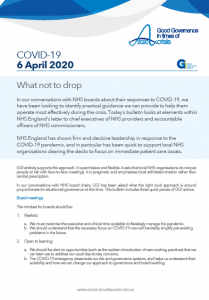What not to drop
06 April 2020

In our conversations with NHS boards about their responses to COVID-19, we have been looking to identify practical guidance we can provide to help them operate most effectively during the crisis. Today’s bulletin looks at elements within NHS England’s letter to chief executives of NHS providers and accountable officers of NHS commissioners.
NHS England has shown firm and decisive leadership in response to the COVID-19 pandemic, and in particular has been quick to support local NHS organisations clearing the decks to focus on immediate patient care issues.
GGI entirely supports this approach. It is permissive and flexible. It asks that local NHS organisations do not put people at risk with face-to-face meetings. It is pragmatic and emphasises local self-determination rather than central prescription.
In our conversations with NHS board chairs, GGI has been asked what the right local approach is around proportionate (or situational) governance at this time. This bulletin includes three quick pieces of GGI advice.
Board meetings
The mindset for boards should be:
1. Realistic:
a. We must maximise the executive and clinical time available to flawlessly manage the pandemic.
b. We should understand that the necessary focus on COVID-19 now will inevitably amplify pre-existing problems in the future.
2. Open to learning:
a. We should be alert to opportunities (such as the sudden introduction of new working practices) that we can later use to address our usual day-to-day concerns.
b. The COVID-19 emergency stress-tests our risk and governance systems, and helps us understand their suitability and how we can change our approach to governance and board working.
3. Alert:
a. Significant new risks have arisen due to COVID-19. Their mitigation and control cannot be parked until later. There are particular and critical issues around quality, safety and staff welfare.
4. Strategic:
a. Reform will need to be returned to – and indeed accelerated – as soon as possible, or health and social care systems will sink when business-as-usual pressures return.
b. Think about what, in March 2021, we will be glad that:
i. we dropped/parked now
ii. we started to do
iii. wasn’t forgotten as a useful lesson.
This is usually a busy time of the year for boards, with various mandatory requirements needing to be formalised through board meetings. NHS England has relaxed these reporting requirements. It also calls for streamlined papers and focused meetings.
We advise that boards should:
- agree a timetable for closing down last year’s business and signing off annual reports etc.
- divide the Part I meeting into two – business as usual and special matters relating to COVID-19
- within business as usual, relate this to assurance around the main BAF risks and any mandatory requirements that cannot be dropped and any mission-critical matters that cannot be avoided – there should be few of these
- note and park what they would usually have been looking at, with the chair and board secretary providing a written narrative as to why this was necessary and how it will be later picked up (not for discussion now, but reflection later)
- within the COVID-19 section, assurance should:
- record a short update from the executive that is deemed sensible for the public record – any general updates for non-executives should not use the forum of the board meeting and non-executives should refrain from just satisfying general curiosity
- clerk for later review significant changes in usual financial, operational or people practices, again with a narrative around why this is being parked.
Quality committees
The guidance from NHS England is clear: quality committees should not be dropped, but we advise that they should change focus. Significant decisions are being made by clinicians in the name of the board right now, and the quality committee should have a good line of sight to the ethics committee and test, through constructive challenge, ethical issues as they affect patient care.
In particular, quality committees can support clinicians and staff through being assured that:
- Do Not Attempt Resuscitation (DNAR) policies are appropriate and being applied, given the severity of COVID-19 among vulnerable people
- the access policy to critical care is correct and being applied appropriately – the quality committee should test and triangulate immediate assumptions around the reasons behind critical care mortality rates
- staff are being protected as far as possible from harm, including issues around personal protective equipment (PPE) and stress, mental health and well-being, tiredness and isolation
- patients and their families are being properly communicated with in the context of caring for patients with an infectious disease that has a high mortality rate
- privacy, dignity and respect are being afforded to patients, again within the context of the caring for seriously ill patients with an infectious disease that has no cure, and that dying patients are receiving appropriate palliative care.
Again, the mindset should be of thinking about the future as well as the present. It is inevitable that individual clinical and care decisions taken now will be scrutinised later; the quality committee should be able to demonstrate that the approach to patient care and supporting/communicating with carers always stayed in line with best practice.
Recording meetings
One area which should not be skimped on is recording the deliberations of the board and committees. Inevitably, much of the reporting from executives will be verbal and some of the decisions taken by management will be made in good faith, but perhaps quickly and with sparse time to examine evidence, draw up options, consider alternatives etc.
Mistakes will be made. For these reasons, GGI advises that it is better to record too much than too little. Board and committee minutes should be thorough, produced quickly and checked by the meeting chair.

